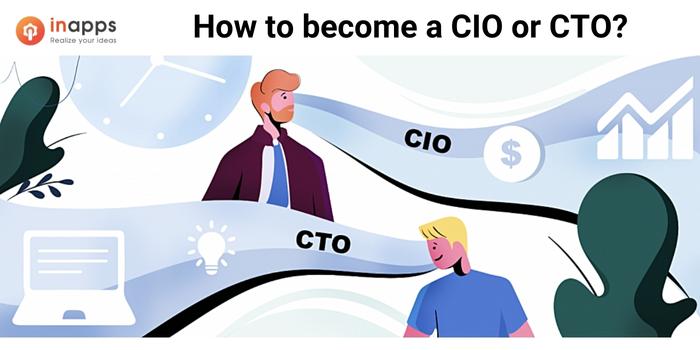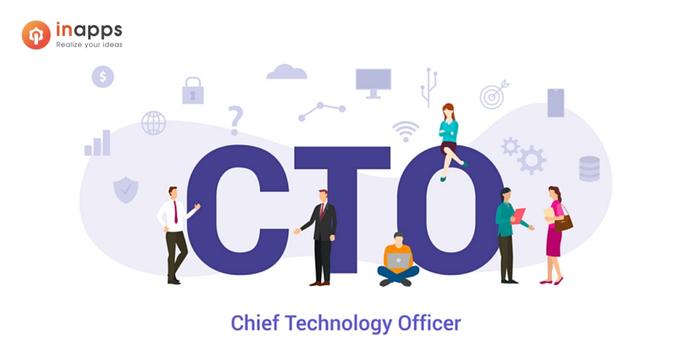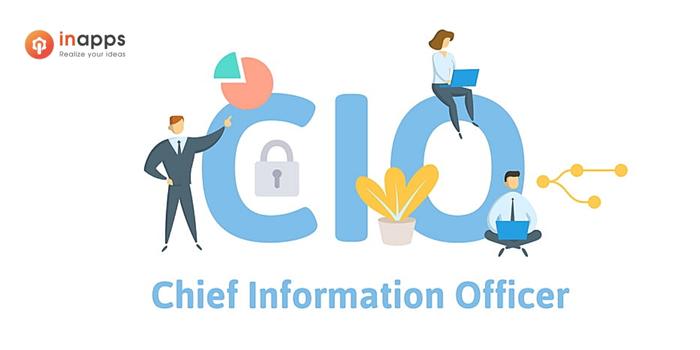In this article, let’s examine the two roles of CTO and CIO (Chief information officer and Chief technology officer) to understand the difference and how they can complement each other to maximize the added value to business organizations.
Yet, the differences between these two roles can be quite confusing at times, because IT consists of both “information” and “technology”. So, the question is how do we distinguish the difference between these two roles?
Generally speaking, CTOs usually look for ways to leverage technologies in order to improve or update the company’s services/products offered to external customers and partners while CIOs would deal with internal matters, targeting to streamline business processes and operations of the company.
What is the role of CTO CIO in organization?

How to become a CIO or CTO
What is a CTO?
Chief technology officers focus on the development of the company’s product and service by using and adopting innovative technologies to support the growth of the company, especially for strengthening the offerings that the company’s customers purchase by using the new technology.
The CTO focuses on external customers – those who buy your company’s products, even if the product itself is not digital or technological. As consumers become smarter and more aware of the products they use, the CTO needs to keep abreast of the latest technology in order for the company to offer the best products.
For that purpose, CTOs often found themselves working with teams of software engineers and developers, as well as sales and marketing and external partners to conduct research and development to improve and innovate the company’s services/products offerings.

In fact, CTO is a technology-focused role which involves architecture, engineering, and product-facing, thus many CTO usually have a background in computer science or software engineering. Othe other hand, a successful CTO must also utilize their other skills such as creativity by evaluating emerging technologies and bring adoption of those technologies into the company in the most appropriate way.
Again, collaboration is also an important skill, as CTOs will have to work with internal product development team and external partners to transform and innovate their businesses.
What is a CIO?
In its simplest sense, the role of the Chief Information Officer is to oversee and align IT with business strategies to streamline and enhance business processes to increase both individual employee productivity and the company as a whole.
Specifically, the CIO is responsible for the overall operations of IT department, and management of critical software applications as well as IT security – from support offices to business systems to service delivery and management.

The CIO could be regarded as an important advocate for all internal technology and digitalizing adoption. IT has generally been working and collaborating frequently with all departments within an organization, so the role of the CIO is to increase the profile and efficiency of a company’s IT services.
However, CIOs do not focus on just technology alone. For example, if a business needs to digitize, improve, or automate many of its repetitive business tasks using technology, the CIO needs to understand the business aspects of those processes, in order to align IT with business, although the actual implementation will be carried out by the IT team.
Extensive knowledge of different kinds of technologies is essential for a CIO to be successful in this role, although one can’t be expected to be master of all. Leadership and communication skills are also important. A CIO should be able to oversee the majority of IT staff and various IT teams and he or she is also required to effectively communicate the needs and offers IT advice to other executives and department heads.
What is the difference between CTO and CIO?

Is CIO and CTO the same?
All in all, the works and operations of the two roles are fall under the same roof, and they will have to work together to realize their strategies and goals to a successful end.
The two don’t always have to interconnect or work together all the time. Their strategies may come across as conflictive sometimes, but working together by understanding the difference between them is what helps to increase innovation in the organization.
CTOs constantly want to improve the products by using and constantly trying new technology stacks and investing money in new projects to increase profitability. These are the expectations for a typical CTO.
The CIO, on the other hand, sets rules that may seek to regulate the CTO’s work and create a process that is more effective and consistent with business objectives.
For CTOs, CIOs could be seen as slowing down innovation. Still, CTO and CIO collaboration is one of the essential catalyst that keep an organization operates efficiently. To make it sustainable, each party must focus on their responsibilities and balance their strength to ensure the success of the organization as a whole when working together.
CTO and CIO: Who Do you need?
While many people who are not working in the IT industry may confuse CIOs and CIOs, both roles are critical to the success of a business. It’s likely for many organizations to consider one role to be more superior over another or combine the two separate roles into one – especially for small businesses that do not have the budget to create both positions, even though this is not the truth.
When it comes to CIO vs. CTO, one is usually not bigger or smaller than the other. In fact, successful companies often have a strong presence of both CIOs and CIOs. Do your best to have both positions present as soon as possible.
If your company is looking to hire the position of a CTO or CIO, consider the followings:
- Is your goal to automate or digitize a business process or product? Or
- Are you looking to provide new, and enhanced experiences for the customers and partners of your company?
Businesses need innovative, innovative solutions that leverage technology to improve their offerings, and they need someone to understand the trends as well and compares them with what others are doing to adopt and promote those advanced technology, enhancing employees’ productivity and business processes.
The roles of both CTO and CIO require extensive technical knowledge and skills to understand what technologies are needed for a company’s technology products and infrastructure. Thus, if you really enjoy learning about new technologies and apply them for businesses, this role could be for you.
Read more about CTO’s corner to know how we take problems off CTOs’ heads. InApps love working with people that consider software the foundation of their company. We’ve assisted CTOs in the following instances over the years.
List of Keywords users find our article on Gooogle
[sociallocker id=\”2721\”]”}” data-sheets-userformat=”{“2″:513,”3”:{“1″:0},”12″:0}”>[sociallocker id=”2721″]
| cio vs cto |
| cio and cto difference |
| difference cio cto |
| cto vs cio |
| difference between cio and cto |
| difference between a cto and cio |
| what is the difference between cto and cio |
| cto cio difference |
| difference between cio and cto roles |
| difference between cto and cio |
| cto recruitment |
| cio jobs |
| cio or cto |
| what s the difference between a cto and cio |
| chief technology officer recruitment |
| cio cto difference |
| cio and cto |
| cio vs cto job description |
| bemaster |
| cio vs it director |
| chief information officer recruitment |
| cto jobs |
| wawa menu |
| difference between a cio and cto |
| chief technology officer vs chief information officer |
| what is the difference between cio and cto |
| cto v cio |
| cto and cio difference |
| cto |
| cto vs cio difference |
| wawa cio |
| cio vs cto difference |
| cio vs. cto |
| what is the difference between a cio and cto |
| difference cio and cto |
| wawa order online |
| cto vs |
| cto versus cio |
| cto real estate |
| director of technology vs cto |
| cto.vn |
| ctos game |
| cios jobs |
| cio hiring |
| how much do cto make |
| chief technology officer (cto) jobs |
| cio focus 2022 |
| ctos company |
| outsourced cio for healthcare systems |
| commerce cio |
| cto growth |
| cio organization vs it department |
| top cios |
| best cio |
| best recruitment crm for small business |
| software development project roles |
“}” data-sheets-userformat=”{“2″:513,”3”:{“1″:0},”12″:0}”>[/sociallocker]
Let’s create the next big thing together!
Coming together is a beginning. Keeping together is progress. Working together is success.



















